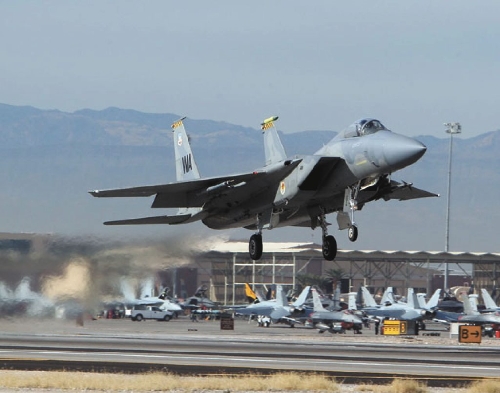Red Flag, Thunderbirds at Nellis targeted for grounding
With "fiscal cliff" budget cuts looming a few weeks away, Air Force leaders said Thursday they probably will cancel upcoming Red Flag air combat training exercises at Nellis Air Force Base and ground the Thunderbirds demonstration team if Congress and the White House don't agree on a solution to the nation's $16 trillion debt.
"I don't know that I would say it would make Nellis ground zero, but we have talked about whether Red Flag would be canceled or curtailed," Air Force Vice Chief of Staff Gen. Larry Spencer said in a news conference call from the Pentagon about the potential effects of automatic budget cuts.
Under those mandatory reductions, known as sequestration, Spencer said that like the Navy's contingency plan for grounding the Blue Angels demonstration team, "we would discontinue the Thunderbirds probably around 1 April."
"I wouldn't want to single out Nellis, but the weapons school (and) a lot of those things that happen at Nellis will be heavily affected by this," he said.
Hanging in the balance is $200 million in civilian support and services contracts.
red flag belt-tightening
Spencer and Acting Undersecretary of the Air Force Jamie M. Morin spoke to reporters about the "ultimate balance of risk," in Morin's words, that the Air Force must weigh concerning the readiness of pilots and potential maintenance issues with the nation's fleets of fighter jets, attack jets and refueling aircraft.
They also said belt-tightening at stateside bases and commands could curtail advance training programs, affect contracts with private companies and hurt the Air Force modernization program including the centerpiece, the F-35 Joint Strike Fighter. The F-35, also known as the Lightning II, is designed to replace aging F-16 fighter jets and A-10 attack jets.
"The cuts under sequestration are going to be devastating," Morin said, adding, "We will see damage to programs like the KC-46 refueling tanker and the F-35 Joint Strike Fighter."
The Air Force might have to reopen bids on those contracts and that would increase procurement costs and cause delays in delivery of the aircraft.
Air Force spokeswoman Megan Schafer said after the news conference that a Red Flag exercise in March at Nellis would go off as planned.
But Morin said future Red Flag exercises including one scheduled for July could be cut, and continuation of Green Flag exercises in which aircraft from Nellis support Army training at Fort Irwin, Calif., would depend on decisions by Air Combat Command leaders.
"I would expect Green Flags (to be) relatively protected but probably not 100 percent for example," Morin said, referring to anticipated combat brigade training cuts in the Army.
CONGRESSIONAL FOOT-DRAGGING
Rep. Joe Heck, R-Nev., who is starting his third year as a member of the House Armed Services Committee, said the comments by Air Force leaders "is disappointing news but not surprising."
He said canceling Red Flag exercises would have trickle-down effects on Las Vegas.
"It does have an economic impact on our community," Heck said. "It's not just a great training opportunity for our pilots but an international training opportunity.
"When you bring in all those foreign participants, they spend money in the community and when they go home they want to bring their families back," he said.
With only seven working days left before automatic cuts kick in, Heck said he is "gravely concerned about coming up with a long-term solution but also concerned about coming up with a short-term delay."
He noted that while the House has passed two different bills to replace the sequester, the Senate "has not offered anything."
Democrats and Republicans have been unable to agree whether the sequester should be averted through other spending cuts, new taxes and revenues, or a mix.
On Sunday, Senate Majority Leader Harry Reid, D-Nev., insisted that any deal must include revenues. He also rejected efforts by Republicans to shield the Pentagon from the upcoming cuts.
"If we are going to have sequester, defense is going to have to give their share," he said during an interview on "This Week With George Stephanopoulos."
LESS FLIGHT TIME, LESS WORK
Spencer said the impact on Air Force operational training this year would stem from a nearly 18 percent reduction in 1.2 million flight hours, or 203,000 flying hours for the fiscal year, which began Oct. 1.
"As of 1 March, we will have flown roughly half those hours, so we will have to cut 33 percent of the remaining program," he said.
At the 2.9 million-acre Nevada Test and Training Range, more than
$200 million is spent annually on payrolls for companies that provide services at the range, the Nellis base and Creech Air Force Base, a hub for drone aircraft operations, 45 miles northwest of Las Vegas, according to the most recent Nellis economic impact statement from 2011. The services range from janitorial to aircraft maintenance and target support.
The specter of automatic budget cuts puts production and delivery of F-35 Joint Strike Fighters to Nellis in jeopardy and government funding for the annual Aviation Nation air show at the base, the largest free public event in Nevada.
Nellis officials have been expecting the first test-and-evaluation F-35 to arrive at the base early this year, with 36 of the versatile fighter jets scheduled for what is called "beddown" at Nellis through 2020. Base officials have been hopeful the first four F-35s would be delivered by March, but that could change.
Under sequestration, the deficit-reduction burden would be split between national security and nonsecurity programs. That means the Department of Defense would be forced to lop an additional $492 billion from its expense accounts nationwide during the next 10 years beginning with $42.7 billion cut in the seven months from March through September.
The sequestration budget cuts would be in addition to a $487 billion cut in defense spending over a decade mandated by the Budget Control Act passed in 2011.
The Air Force would have to shoulder a $12.4 billion shortfall off the current budget plus an estimated $1.8 billion shortfall in funding for overseas operations. If sequestration is not averted, however, the Office of the Secretary of Defense has directed protection of funding for wartime operations, Wounded Warrior programs and, to some extent, programs linked to the new defense strategy.
Stephens Washington Bureau Chief Steve Tetreault contributed to this report. Contact reporter Keith Rogers at krogers@reviewjournal.com or 702-383-0308.


















